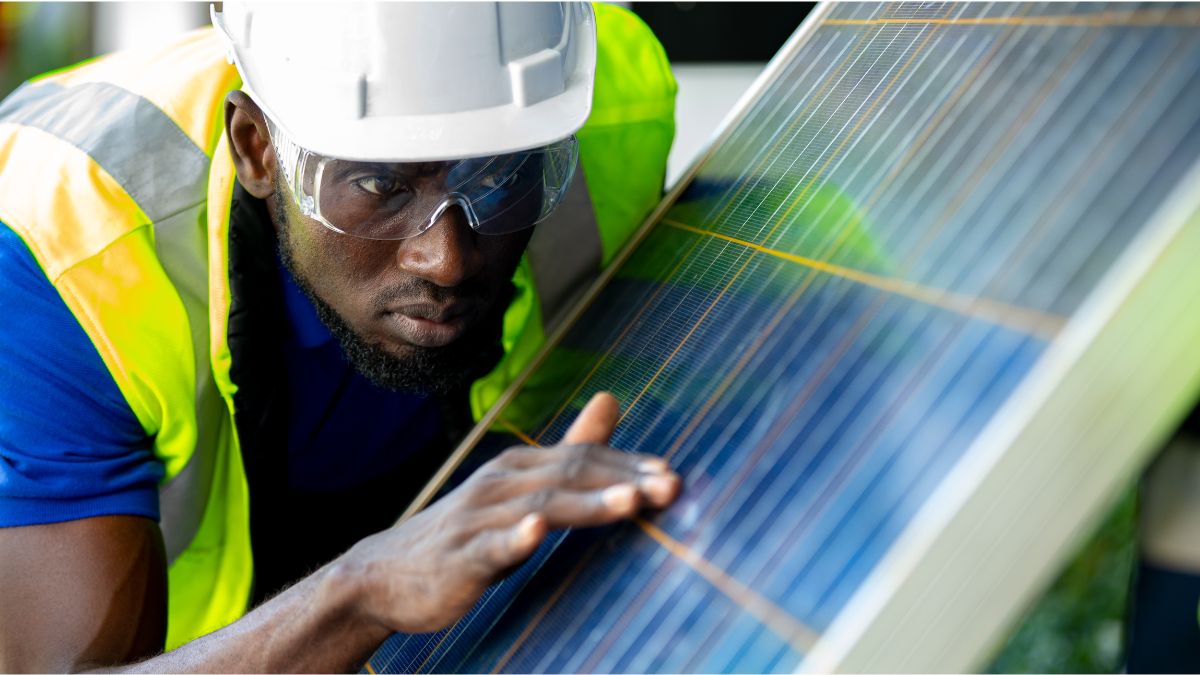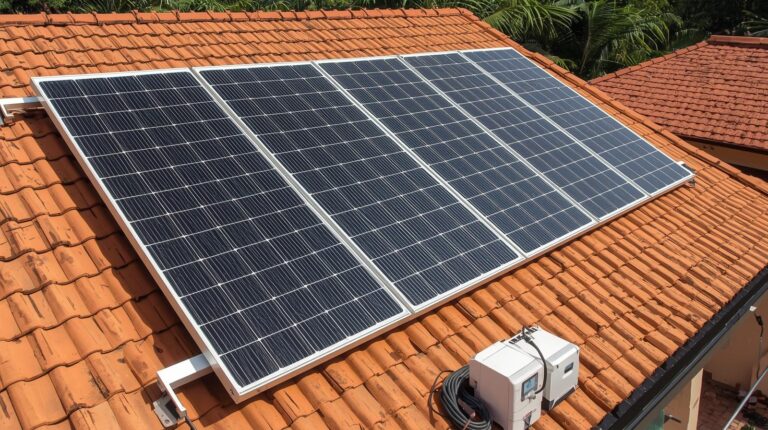You’ve made the decision to switch to solar power – that’s fantastic! Now, the next step is choosing the best solar panel for your home. By gathering the right information, you can make an informed decision that will not only save you money but also maximize the benefits of your solar investment. Let’s take a look at the key factors you should consider to make the best decision.
Key Takeaways
- Consider solar panel efficiency and compare it to the industry average
- Check the manufacturer warranties of solar panels against the industry average
- Evaluate the cost of solar panels in relation to their efficiency
- Look for customer reviews and ratings of different solar panel brands
Understanding Solar Panel Efficiency
Solar panel efficiency is key when choosing the best solar panel for you, as it can affect the cost and power output of your system. Calculating the payback on an efficient panel can help you maximize your output and optimize your installation.
With higher efficiency panels, you can also benefit from lower panel maintenance and more government incentives. When researching different solar panel models, check the efficiency rating to make sure it meets your needs. This rating is expressed as a percentage and should be compared to the industry average of 16-18%.
Consider the cost in relation to the efficiency to determine the best option for you. Knowing the efficiency of your chosen panel can help ensure you get the most out of your solar system.
Related Post: How To Test Solar Panel Output To Maximize The Efficiency.
Comparing Solar Panel Costs
Comparing costs can be tricky, but it’s important to weigh efficiency versus price to get the most out of your system. Analyzing customer reviews and comparing solar panel warranties can help you make an informed decision.
Assess the durability of the panels by looking for manufacturer warranties that guarantee the power production of panels over 25 years. Evaluate inverter options such as string inverters and module-level power electronics (MLPEs) to determine the best inverter for your system.
Finally, research solar installer certifications, licenses, track record, and reputation to ensure quality installation. With the right knowledge, you can make an informed decision when choosing the best solar panel for you.
Evaluating Solar Panel Quality
When evaluating solar panel quality, it’s important to compare efficiency to industry averages. You should also examine customer reviews and ratings. Additionally, assess production, durability, and manufacturer quality.
Solar panel warranties are a good indicator of quality, so look for those that guarantee power production for over 25 years. Check for power rating, power tolerance, efficiency, and temperature coefficient.
Customer reviews can also provide helpful insight into the reliability of different solar panels. Production, durability, and manufacturer quality should also be taken into account. When combined, these factors can help you identify the best solar panel for your home.
Choosing the Right Inverter
Understanding the role an inverter plays in solar energy conversion is crucial when selecting the right one. When choosing between string inverters and module-level power electronics (MLPEs), like microinverters or power optimizers, consider your specific installation conditions.
String inverters are the lowest cost option for optimal production conditions, while MLPEs are more expensive but can be more efficient in shaded or suboptimal installations. Professional consultation is always advised to determine the best inverter for your system.
Selecting a Solar Energy Provider/Installer
Researching solar energy providers and installers is an important step when deciding on a system for your home. Consider the following when selecting a solar energy provider:
- Local vs national installers: Local companies may offer better quality equipment at lower prices, while national installers can provide more extensive warranties.
- Certifications: Review certifications, licenses, track record, and reputation of potential installers to ensure they are qualified.
- Workmanship warranties: Look for installers who use subcontractors sparingly and warranty their workmanship.
- Reputable platforms: Use pre-vetted installers from reputable platforms like EnergySage Solar Marketplace.
- Customer reviews: Check customer reviews for feedback.
With the right research and reviews, you will be able to choose the best solar energy provider for your needs.
Related Article: 7 Red Flags of Solar Power Scams You Need to Be Aware Of!
Frequently Asked Questions
What Is the Expected Lifespan of Solar Panels?
Solar panel warranties typically range from 10-25 years, and panel efficiency ratings can vary from 16-18%. Installation costs, space requirements, and energy efficiency are all important factors to consider when making your decision.
How Much Money Can I Save by Installing Solar Panels?
Installing solar panels can save you money on energy costs and reduce your environmental impact. Factors like roof preparation, energy efficiency, local incentives, and the cost of the solar installation all affect your savings. Learn more to find the best system for you.
What Type of Maintenance Do Solar Panels Require?
You need to keep your solar panels clean, adjust the panel placement, monitor the voltage output, maintain battery storage, and consider solar tracking. Doing so will help ensure your system is running optimally and delivering the energy you need.
What Is the Difference Between String Inverters and Mlpes?
String inverters are the most cost-effective option, but MLPEs like microinverters & power optimizers offer higher efficiency & better environmental impact. Installation process varies & efficiency ratings depend on the weather conditions. Compare the cost & efficiency to choose the one that suits you best.
How Do I Know if a Solar Energy Provider Is Reliable?
To ensure you’re getting the most reliable solar energy provider, compare installation requirements, cost, local renewable energy regulations, and energy storage options. Check reviews, ask questions, and compare providers to find the best fit.
Conclusion
Choosing the right solar panel for your home is an important decision. Evaluate efficiency, cost, customer reviews, production, and durability to find the right balance of cost and quality.
Ensure that the panels meet reliability standards, such as IEC 61215, and compare various solar energy providers and installers to make sure you’re getting the best deal. With the right research and decision, you can find the perfect solar panel solution for your home.




